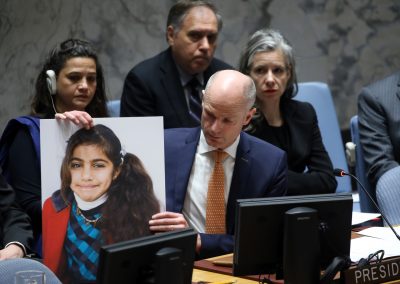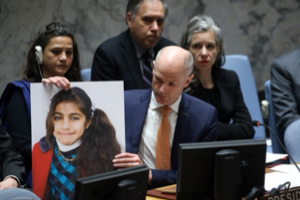By Abbas Al-Moussa, TDA Coordinator for the Legal Reform Project.

“The Assad regime has committed horrific crimes time and again. The evidence is overwhelming. There must be consequences. Huge numbers of Syrians were subjected to torture, murder, enforced disappearance, and poisonous gas attacks, or lost everything whilst fleeing for their lives,” stated Stef Blok, Dutch Minister for Foreign Affairs, in a press release.
On September 18, 2020, the Dutch Ministry of Foreign Affairs announced its government’s intention to hold the government of Syria accountable for violating the United Nations Convention against Torture, ratified by both countries.
This statement came shortly after the Dutch government sent a letter to its Parliament, expressing its intention to hold the Syrian regime accountable before the International Court of Justice for perpetration of torture crimes and use of poisonous gases in its attacks against Syrian civilians, and confirming it had already informed the regime’s mission to the United Nations whilst expressing a willingness to negotiate with guarantees the torture would stop, otherwise endeavors to prosecute before the International Court of Justice would proceed.
The Dutch decision sparked wide debate. Some countries, including Germany, welcomed the Dutch decision. Meanwhile, the Syrian regime’s response was an arbitrary accusation that the Netherlands controls the International Court of Justice, which exists on its territory, and to consider this a step that “bypasses the role of the United Nations,” stating that the Netherlands “has no right to talk about advocating for human rights when it is involved in supporting terrorist organizations fighting in Syria”.
On the other hand, some Syrian human rights activists welcomed the Dutch move, viewing it as a first step to achieving justice for victims and closer to the trial of the Assad regime, while others saw it as merely a symbolic belated step, given that the regime should be tried before the International Criminal Court and not the International Court of Justice. Others still had reservations about the Netherlands addressing the regime, thereby lending it legitimacy.
These reactions prompted us at TDA to discuss the details of this step and attempt to simplify information and respond to questions and concerns raised amongst Syrians. We present this in a question and answer format.
What is the International Court of Justice? On what basis does it have jurisdiction in the Syrian case?
The International Court of Justice is the principal judicial organ of the United Nations, dealing only with complaints between UN member states. The court is responsible for adjudicating in accordance with the provisions of international law in legal disputes that arise between states, and providing advisory opinions on legal issues that may be referred to it by the United Nations organs and specialized agencies.
In the Syrian case, the court’s jurisdiction is based on the Syrian government’s violation of its obligations under the UN’s 1984 Convention Against Torture, ratified in 2004, forming the basis for what is known as a legal dispute between two countries: the Dutch government moved against the Syrian, as should all countries that have ratified the Convention.
Why the International Court of Justice and not the International Criminal Court?
One way to prosecute the regime before the ICC would be by referral via the UN Security Council. Since the revolution began in 2011, there have been repeated attempts by Security Council members to refer the Syrian regime’s crimes to the International Criminal Court, but these have been thwarted every time by a Russian-Chinese double veto.
A second way was through the Rome Statute, the treaty that establishes the prosecutorial jurisdiction of the ICC. This was also inapplicable in the Syrian case, as Syria is not a signatory of the Rome Statute, and therefore the state lies outside the Court’s territorial jurisdiction. The third way, which also seems impossible in this case, is to request the government of the country in question to open its own case before the Court, even if it is not a signatory to the Rome Statute.
Faced with these dead ends, and with the Syrian regime continuing its serious violations of international humanitarian law and international human rights law, the Dutch government resorted to the International Court of Justice.
It must be noted that bringing the case to the International Court of Justice does not replace nor will it hinder in the future resorting to the International Criminal Court. On the contrary, its procedures and rulings will provide solid legal basis and support for criminal accountability efforts, and strengthen the position of victims and their advocates.
Why did the Netherlands address the Syrian regime? Why invite it to negotiate? Does this not legitimize the regime?
In its step against the regime, the Dutch government relied on provisions of the UN Convention against Torture, which gives its states parties the right to prosecute a violating state, especially since the claimant state cannot directly approach the International Court of Justice.
Under Article 30 of the Convention against Torture, the claimant state is obligated to address the violating state, negotiate with it and settle the situation through arbitration within a period of six months from the date of notification. In the event the violating state does not respond or arbitration does not reach a conclusion during this period, the claimant state has the right to resort to the International Court of Justice.
These are purely legal procedures and have no political dimension pertaining to the legitimacy of the violating state; the International Court of Justice is not competent in political affairs, its procedures, decisions and address towards a violating state is limited to examining complaints between UN member states, including Syria who is also a party to many international conventions such as the Convention against Torture.
What could the outcome of this complaint be if it were brought before the International Court of Justice? Can the Court take action which is binding?
If the complaint is brought before the International Court of Justice – which is likely, given the Syrian regime’s intransigence and refusal to respond to the Dutch government’s request – the ICC’s decision and vision would be an important source to strengthen the legal argument and put greater pressure on political parties influencing the Syrian case.
This Court is also the only legal framework to hold a violating state entity accountable, and can impose legally binding procedures and rulings upon reviewing the complaint before it.
A significant accomplishment of the present trial would be temporary measures against the regime and its institutions during the course of the complaint; for instance, compelling it to implement measures to stop practices that violate the Convention, and to preserve physical and contextual evidence that can help in holding it accountable, since the Court can rely on human rights organizations’ reports, on sources of information and evidence, and on victims’ testimonies.
The path to achieving justice may be long and arduous and lined with obstacles. This requires us to create opportunities to reach victory for the victims and accountability for the violators. This step by the Dutch government could be an opportunity for us Syrians to hold the regime accountable for its crimes against us.
By Abbas Al-Moussa, TDA Coordinator for the Legal Reform Project.
